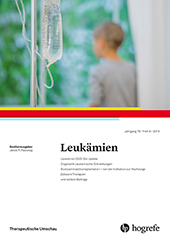Myelodysplastische Syndrome
Abstract
Zusammenfassung. Die Myelodysplastischen Syndrome umfassen eine heterogene Gruppe von Krankheiten, zu den myeloischen Neoplasien zählend, mit ganz unterschiedlicher Prognose. Die Standarddiagnostik umfasst die morphologische Beurteilung von Blut und Knochenmark sowie die Durchführung einer konventionellen Zytogenetik. Risiko-Scores wie der IPSS und der IPSS-R erlauben eine Schätzung der Prognose hinsichtlich Überlebens und der Progression in eine akute myeloische Leukämie. Patienten sind meist älter und weisen Komorbiditäten auf. Die Therapie umfasst von Supportmassnahmen über niedrig dosierte Chemotherapie bis zur Stammzelltransplantation ein sehr heterogenes Feld. Therapiegrundlage ist die supportive Therapie vor allem mit Gabe von Erythropoese stimulierenden Faktoren (ESF), Erythrozytenkonzentraten und ggf. notwendig werdender Eisenchelation. Für Patienten mit fortgeschrittenem MDS, welche für die Durchführung einer allogenen Stammzelltransplantation nicht geeignet sind, sind niedrig dosierte Chemotherapie z. B. Azacitidin wirksam und verträglich.
Abstract. Myelodysplastic Syndromes are a heterogenous group of myeloid neoplasias with differing prognosis. Diagnostics include morphology of blood and marrow and cytogenetic analysis. Risk scores, such as the IPSS or IPSS-R allow for prognostication of survival and the probability of transforming to acute myeloid leukemia. Most patients are elderly and may present with co-morbidities that need to be taken into account. Treatment measures include supportive care as well as low dose chemotherapy and up to hematopoetic cell transplantation and are therefore equally heterogenous in intensity. Supportive measures consist of transfusion of red cells but also platelets, erythropoiesis stimulating agents (ESA) and if transfused, iron chelation. In older patients with advanced MDS, who are not candidates for hematopoetic cell transplantation, low-dose chemotherapy such as with hypomethylating agents, e. g. azacyitinde is reasonably effective and well tolerated.



